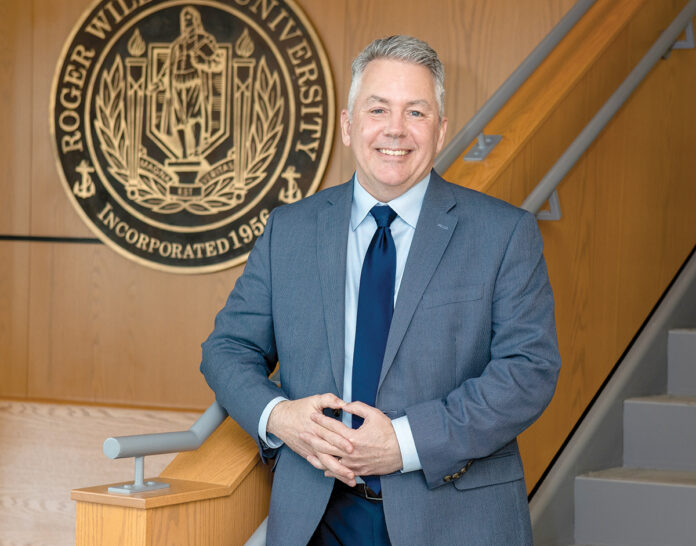
2022 C-Suite Awards: Nonprofit/Social Service Agency | Brian Williams, Roger Williams University chief of staff
Helping lead a university’s COVID-19 response while spearheading strategic planning for the future is a daunting task. But it’s a task that Chief of Staff Brian Williams has shown he is more than able to handle at Roger Williams University in Bristol.
“What always impresses me is that he handles a lot of serious and complicated issues but he’s always so calm and optimistic,” said Amy Tiberio, RWU’s vice president for enrollment management. “It just sets a really great example for anybody that looks to him as a leader that he can remain positive despite being the central location for some of the more difficult decisions that need to get made.”
Williams, who previously served as vice president for enrollment management and was promoted to chief of staff two years ago, has overseen the university’s pandemic response from March 2020 onward. The university now has a student, faculty and staff vaccination rate of 96%. Williams contextualizes this figure, saying, “As a community, that response tells you a lot about Roger Williams, who we are and the types of community members we have that it’s protecting ourselves and protecting others.”
Williams classifies the university’s COVID-19 approach into four phases. The first was when the school went fully remote in spring 2020 when students left for spring break and didn’t return that semester for in-person classes. The second was moving to in-person classes again in fall 2020 with contact tracing and testing measures in place. The third has been marked by the role that vaccination and masking has played in lowering transmission levels. Now that the university has transitioned to optional masking as of March 21, Williams says the fourth phase in the future will be “moving from a pandemic to an endemic,” with testing and masking in the university’s arsenal if an increased transmission rate occurs.
Williams says maintaining good communication with students, faculty and staff during the pandemic has been a crucial step in terms of providing up-to-date information and promoting safety on campus.
“It’s impossible to over-communicate,” Williams said. “I think a big lesson from a lot of us across the administration is that when things are happening in real time, we need to be mindful of the overall communication that everybody hears and information that any given individual needs at that moment.”
In terms of providing the latest information and university communications, Williams has been a big proponent of using data and technology to keep the community informed.
“I was an English major undergraduate, so I look at how you tell stories with data,” Williams said.
One innovation that he helped get off the ground is the university’s COVID-19 dashboard, which provides information about the campus positivity rate, as well as the number of tests conducted in a specific time frame.
In addition to playing a pivotal role in the school’s pandemic response, Williams has kept an eye on the university’s future. In particular, Williams mentions a few key elements of the university’s strategic planning, which he says includes focusing on “making sure we’re providing the education, the training and the skills across our campuses that students need to be successful.” Williams also said RWU is looking at the role of majors and minors and career and academic advising paths that students need, plus “looking really closely at what the next evolution of the space of the campus looks like.”
Tiberio says Williams has taken the chief of staff role in stride, even among the myriad challenges thrown his way. Tiberio said Williams “provided that leadership that we really needed as a community,” adding that he “could have said, ‘Let’s just put strategic planning on hold because we have a crisis ahead of us,’ but he knew that it was going to be important that we found a way to do both things. I just think that that was really above and beyond.”
For Williams, his job is never quite finished.
“You’re never done helping people be the best that they can be, day in and day out for our students,” Williams said.











